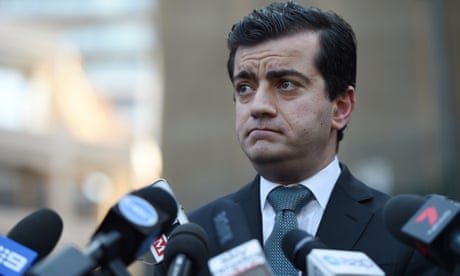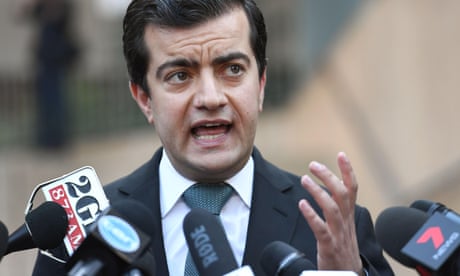By Michelle Grattan
The Government couldn't have had a more appropriate week for the release of the report from the parliamentary joint committee on intelligence and security, which has examined its legislation to counter Chinese interference.
Bipartisan agreement in the report, tabled Thursday, on the 60 recommendations, covering minor and more substantive amendments, has paved the way for a bill that has infuriated Chinese authorities to clear Parliament within weeks.
A couple of current instances have highlighted how China engages in unsubtle pressure.
Qantas confirmed it would bow to China over how the carrier refers to Taiwan in its advertising and on its website.
This followed a demand to three dozen airlines that they make clear that Taiwan, Hong Kong and Macau are part of China.
The Government was understanding of Qantas's position, accepting it had little choice.
On a very different front, former foreign minister Bob Carr, aka Beijing Bob, an outspoken friend of China, who heads the Australia China Relations Institute at the University of Technology Sydney, was unable to get visas for journalists (including from Fairfax and News Corp) to go on one of the sponsored visits to China he hosts.
Bob says "the assumption is that [this] is part of the freeze China is applying to bilateral visits" — a freeze that has hit ministers.
Then there is the much-publicised controversy about Facebook sharing user data with, among many companies, several Chinese ones including Huawei, a telecommunications-equipment giant that the Australian Government has not permitted to tender for National Broadband Network contracts.
We're well past the optimistic days when we believed it could be all upside in our relationship with China, which has over the years delivered an economic bonanza for Australia.
The Government was understanding of Qantas's position, accepting it had little choice.
On a very different front, former foreign minister Bob Carr, aka Beijing Bob, an outspoken friend of China, who heads the Australia China Relations Institute at the University of Technology Sydney, was unable to get visas for journalists (including from Fairfax and News Corp) to go on one of the sponsored visits to China he hosts.
Bob says "the assumption is that [this] is part of the freeze China is applying to bilateral visits" — a freeze that has hit ministers.
Then there is the much-publicised controversy about Facebook sharing user data with, among many companies, several Chinese ones including Huawei, a telecommunications-equipment giant that the Australian Government has not permitted to tender for National Broadband Network contracts.
We're well past the optimistic days when we believed it could be all upside in our relationship with China, which has over the years delivered an economic bonanza for Australia.
Turnbull, like Rudd, tough-minded on China
Trade Minister Steve Ciobo tries to shrug off problems as minor irritants, but presumably that's just his job.
Others in the Government have become more forthright.
It's notable that of recent prime ministers, Kevin Rudd and Malcolm Turnbull, both very knowledgeable about China, have been the most openly tough-minded towards it.
It's notable that of recent prime ministers, Kevin Rudd and Malcolm Turnbull, both very knowledgeable about China, have been the most openly tough-minded towards it.
Before becoming PM, each was regarded as China-friendly.
Of the various causes of current tensions in the relationship, the legislation against foreign interference is on the top shelf (together with Australia's stand on the South China Sea).
The purpose of the legislation, unveiled late last year, is to "comprehensively reform key offences dealing with threats to national security, particularly those posed by foreign principals".
Among its provisions, it "introduces new foreign interference offences targeting covert, deceptive or threatening actions by foreign actors who intend to influence Australia's democratic or government processes or to harm Australia".
At its core, what this legislation does is to criminalise foreign interference that is one step below espionage.
Of the various causes of current tensions in the relationship, the legislation against foreign interference is on the top shelf (together with Australia's stand on the South China Sea).
The purpose of the legislation, unveiled late last year, is to "comprehensively reform key offences dealing with threats to national security, particularly those posed by foreign principals".
Among its provisions, it "introduces new foreign interference offences targeting covert, deceptive or threatening actions by foreign actors who intend to influence Australia's democratic or government processes or to harm Australia".
At its core, what this legislation does is to criminalise foreign interference that is one step below espionage.
ASIO has always been able to investigate such interference, but it hasn't actually been a criminal offence.
While the Government goes out of its way to say the legislation is not aimed at any individual country, everyone knows China is in its sights.
While the Government goes out of its way to say the legislation is not aimed at any individual country, everyone knows China is in its sights.
As is Russia, after the experience in the United States and elsewhere.
ASIO warned of 'unprecedented' foreign activity
Duncan Lewis, head of ASIO, emphasised the foreign threat in evidence to Senate estimates last month, describing the current scale of foreign intelligence activity against Australian interests as "unprecedented".
"Foreign actors covertly attempt to influence and shape the views of members of the Australian public, the Australian media, officials in the Australian Government and members of the diaspora communities here in Australia," he told the hearing.
"Foreign states maintain an enduring interest in a range of strategically important commercial, political, economic, defence, security, foreign policy and diaspora issues," he said.
Clarity on 'espionage', 'sabotage' and 'interference'
Where possible, Opposition Leader Bill Shorten tries to stick like glue to the Government on national security issues, for reasons of politics as well as substance.
Journalism defence beefed up
The changes will give greater protection to the media, expanding the public interest defence for journalists, and making it clear that editors, legal advisers and administrative staff will all be covered by the journalism defence.
Before a journalist can be prosecuted over reporting classified documents, the head of the relevant agency will have to certify that they were properly classified, and the attorney-general must consent to the legal action.
The Government, accepting some criticisms of the legislation, itself put forward certain amendments.
The committee — which is still examining an accompanying bill to set up a register of those working on behalf of foreign governments and other interests — said that after three years there should be a review of the operation of key parts of the foreign influence legislation.
The agreed changes haven't satisfied critics such as the Law Council and Amnesty International.
ASIO warned of 'unprecedented' foreign activity
Duncan Lewis, head of ASIO, emphasised the foreign threat in evidence to Senate estimates last month, describing the current scale of foreign intelligence activity against Australian interests as "unprecedented".
"Foreign actors covertly attempt to influence and shape the views of members of the Australian public, the Australian media, officials in the Australian Government and members of the diaspora communities here in Australia," he told the hearing.
"Foreign states maintain an enduring interest in a range of strategically important commercial, political, economic, defence, security, foreign policy and diaspora issues," he said.
Clarity on 'espionage', 'sabotage' and 'interference'
Where possible, Opposition Leader Bill Shorten tries to stick like glue to the Government on national security issues, for reasons of politics as well as substance.
Given this, and the usual bipartisan functioning of the intelligence and security committee, it is not surprising that agreement has been reached on a refined version of the bill.
Many of the changes, as Attorney-General Christian Porter noted, are to definitions and drafting — which doesn't make them unimportant.
These include clarifying that "prejudice to national security" has to involve an element of harm, not just embarrassment.
Many of the changes, as Attorney-General Christian Porter noted, are to definitions and drafting — which doesn't make them unimportant.
These include clarifying that "prejudice to national security" has to involve an element of harm, not just embarrassment.
There'll be clarification of "espionage", "sabotage", "political violence" and "foreign interference".
Changes will reduce the maximum penalties for the new secrecy offences, and require the attorney-general's consent for a prosecution under them.
An amendment will ensure the staff of the Inspector-General of Intelligence and Security are properly protected.
Changes will reduce the maximum penalties for the new secrecy offences, and require the attorney-general's consent for a prosecution under them.
An amendment will ensure the staff of the Inspector-General of Intelligence and Security are properly protected.
Journalism defence beefed up
The changes will give greater protection to the media, expanding the public interest defence for journalists, and making it clear that editors, legal advisers and administrative staff will all be covered by the journalism defence.
Before a journalist can be prosecuted over reporting classified documents, the head of the relevant agency will have to certify that they were properly classified, and the attorney-general must consent to the legal action.
The Government, accepting some criticisms of the legislation, itself put forward certain amendments.
The committee — which is still examining an accompanying bill to set up a register of those working on behalf of foreign governments and other interests — said that after three years there should be a review of the operation of key parts of the foreign influence legislation.
The agreed changes haven't satisfied critics such as the Law Council and Amnesty International.
But the political deal is now in place.
Meanwhile Mr Porter explicitly cast an eye to coming elections.
Meanwhile Mr Porter explicitly cast an eye to coming elections.
"Activity which is designed to interfere or influence our democratic processes is at its most acute when democratic processes are taking place and that means five by-elections in late July and then the full general election," he said.
The Government, saying it wants the legislation passed before the Parliament rises at the end of June for the winter recess, is preparing for more angry reaction from Beijing.
The Government, saying it wants the legislation passed before the Parliament rises at the end of June for the winter recess, is preparing for more angry reaction from Beijing.


